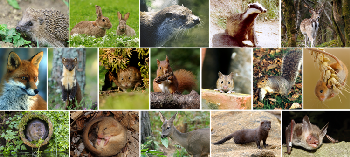|
How many of Britain's wild mammals have you
seen?

PEOPLE'S Trust for Endangered Species (PTES) is calling
for an army of volunteers to record any sightings of wild mammals they see in
their gardens or local green spaces, as part of its annual Living with Mammals
survey.
Now in its 15th year, PTES' Living with Mammals survey relies on members of the
public volunteering their time for a few weeks between Monday 3 April and the
end of June. Volunteers are required to choose a site close to their home or
place of work, and to spend a short time each week looking out for wild mammals
or the signs they leave behind. Volunteers can record their sightings online or
via paper forms.
David Wembridge, Surveys Officer at PTES, explains:- "Living with Mammals
provides a nationwide picture of how wildlife is faring in our Towns and Cities.
Recording wildlife and tracking how numbers are changing is key to ongoing
efforts to conserve it."
Last year, grey squirrels were recorded at 7 out of every 10 sites, making them
the most commonly reported wild mammal in the survey. But grey squirrels are
just 1 of the 28 wild mammal species that have been recorded during Living
with Mammals. Over the survey's 15 year history, mammal sightings range from
smaller species such as wood mice, water voles and hedgehogs, to much larger
species including deer, badgers, foxes and otters.
David Wembridge, Surveys Officer at PTES, continues:- "One thing to come
out of this survey is the surprising number of different mammals present in
urban areas. Some are only rare visitors to our gardens and parks, but if we can
encourage that diversity, it's a good indication of the natural health of our
towns and cities."
Many of Britain's mammals, including the hedgehog; recently voted as the
nation's favourite mammal in a 2016 poll; foxes, grey squirrels and bats, are
typically found in household gardens, recreational areas, cemeteries and
brownfield sites, but other green spaces close to buildings may also provide a
home to them. However, there are some mammals that only live in certain parts of
the country: red squirrels are found mostly in Scotland, on the Isle of Wight
and in northern England; while hazel dormice, which are rare but occasional
visitors to gardens, are mostly found in southern counties of England and in
Wales.
Wembridge concludes:- "The natural world is never far away from us, even
in Towns and Cities. The presence of wild mammals is a positive sign of the
health of theses spaces, and while it may not be commonplace to see some of
these species, we can still find a surprising number. Taking part in Living with
Mammals is a huge help to PTES' ongoing conservation efforts."
To take part in PTES' 2017 Living with Mammals survey, register
online.
If you want to support PTES' ongoing conservation work, you can donate ₤3 by
texting:- 'PTES17 ₤3' to 70070. |
